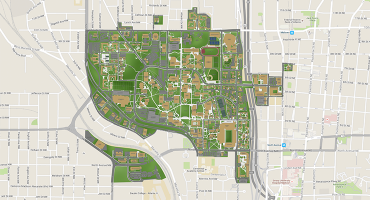Project networks span a multiplicity of organizational boundaries requiring information systems to integrate across boundaries. Recent advancements in parametric 3-D CAD modeling tools have created challenges for organizations implementing such tools. In this research, we are developing strategies to improve implementation of boundary spanning information systems and developing tools to support and understand the virtualization of the engineering workforce in globally distributed networks of engineers.
Institute for Critical Technology and Applied Science
This project develops a new idea of crowdsourcing-based design of wireless networks, where the spare storage capacity of the edge devices (mobile phones and cellular base stations) is used to cache popular content which can then be asynchronously delivered to other users on demand. This idea is particularly relevant for the video-based traffic, which is known to exhibit a high degree of spatiotemporal correlation. We develop a synergistic data-driven approach to the design, analysis, and optimization of crowdsourcing-based wireless networks that brings together concepts from communications and information theories, big data, crowdsourcing, point process theory, and stochastic geometry.
Construction Industry Institute #RT326
The engineering and construction industry is increasingly utilizing geographically distributed, virtual teams to execute project work. This is driven by industry globalization, advancements in virtual team tools, and the need to remain competitive, among other reasons. Yet, organizations are reporting varying degrees of virtual team success. In this research we are first determining the industry’s current and recent past use of technology, processes, procedures and policies for virtual teamwork. Then, we are determining why teams have had varying degrees of success with virtual teams. Finally, we are develop a decision-making and implementation tool that aims to help engineering and construction organizations to maximize virtual team performance.
National Science Foundation #1212673 (formerly #0943069)
Researching virtual organizations challenges researchers to adapt to new constraints and provides possibilities to exploit new opportunities. In studying the organizational implications of executing complex design work in virtual environments, we found that traditional organizational research methodologies were time consuming, often difficult to implement, and failed to exploit the information richness of the virtual environment. This research entails: (1) CyberGRID Net – developing a research data collection and analysis tool integrated into an existing global virtual engineering team working environment, and (2) CyberGRID Networks – utilizing that tool to develop fundamental insights into how globally distributed engineering teams enact complex design work together and with affordances in the virtual environment.
TEXT
Alfred P. Sloan Foundation Industry Studies Fellowship Research
This research fills a gap in understanding of how intercultural networks of firms originating from the same specialization (e.g., engineering designers) navigate knowledge system exchanges through the interactive use of boundary objects. This central question examined in this research is how engineering design firms in cross-cultural, global project networks exchange, develop and resolve conflicts in knowledge systems through the use of intermediate boundary objects. We focus specifically on how a 3D CAD integrated information system is used to resolve knowledge system conflicts that emerge during knowledge exchanges. The findings are elucidating strategies that can help maintain the innovative edge of the U.S. engineering workforce.
FUNDING
National Science Foundation
Amount: $49,213
Duration: 2019 – 2020
Title: Smart City Digital Twin Convergence Workshop
Georgia Department of Transportation
Amount: $99,998
Duration: 2019 – 2020
Title: Social Media-Informed Urban Crisis Detection
Georgia Smart Communities Challenge
Amount: $25,000
Duration: 2019 – 2020
Title: Smart Uptown Columbus
U.S. Dept. of Defense – Combating Terrorism Technology Support Office
Amount: $538,018
Duration: 2018 – 2020
Title: P2 Vision-Interactive Augmented Reality
National Science Foundation – Information and Intelligent Systems Program – Grant #1760645
Amount: $187,739
Duration: 2017 – 2019
Title: Discovering Crises Within Crises – Real-Time Detection, Tracking and Visualization of Emergent Crises in Hurricanes
Institute for Critical Technology and Applied Science (Virginia Tech)
Amount: $60,000/yr
Duration: 2016 – 2018
Title: CrowdWireless: Crowdsourcing-Based Content-Centric Design for Wireless Networks
Construction Industry Institute #RT326
Amount: $172,998
Duration: 2014 – 2016
Title: Maximizing the Performance of Virtual Teams in the Engineering and Construction Industry
National Science Foundation – Cyber-Human Systems Program – Grant #1212673 (formerly #0943069)
Amount: $316,584
Duration: 2009 – 2014
Title: CyberGRID Networks
Alfred P. Sloan Foundation Fellowship
Amount: $45,000
Duration: 2009 – 2013
Title: Understanding the Role of Boundary Objects in Resolving Knowledge System Conflicts
COLLABORATORS
FACULTY
Pauli Alin
Assistant Professor, Utah Valley University
Phil Bernstein
Professor, Yale University
Semra Comu
Assistant Professor, Bogazici University
Harpreet Dillon
Assistant Professor, Virginia Tech
Carrie Sturts Dossick
Professor, University of Washington
Timo Hartmann
Professor, Technical University of Berlin
Josh Iorio
Assistant Director & Adjunct Professor, Virginia Tech
Amy Javernick-Will
Associate Professor, University of Colorado-Boulder
Ashwin Mahalingam
Professor, Indian Institute of Technology – Madras
Neda Mohammadi
Post-doctoral Fellow, Georgia Tech
Riitta Smeds
Professor, Helsinki University of Technology


